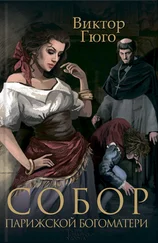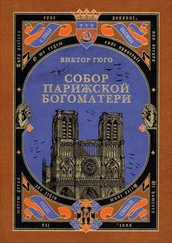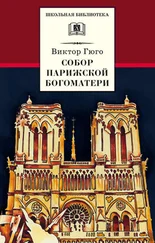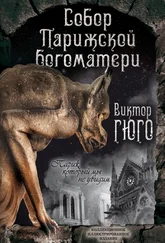| The same woman's voice, which had interrupted the gypsy's dance, interrupted her song. |
Тот же голос, который прервал пляску цыганки, прервал теперь и ее пение. |
| "Will you hold your tongue, you cricket of hell?" it cried, still from the same obscure corner of the place. |
- Замолчишь ли ты, чертова стрекоза? -послышалось из того же темного угла площади. |
| The poor "cricket" stopped short. |
Бедная "стрекоза" умолкла. |
| Gringoire covered up his ears. |
Гренгуар заткнул себе уши. |
| "Oh!" he exclaimed, "accursed saw with missing teeth, which comes to break the lyre!" |
- О проклятая старая пила, разбившая лиру! -воскликнул он. |
| Meanwhile, the other spectators murmured like himself; |
Зрители тоже ворчали. |
| "To the devil with the sacked nun!" said some of them. |
- К черту вретишницу! - возмущались многие. |
| And the old invisible kill-joy might have had occasion to repent of her aggressions against the gypsy had their attention not been diverted at this moment by the procession of the Pope of the Fools, which, after having traversed many streets and squares, debouched on the Place de Gr?ve, with all its torches and all its uproar. |
Старое незримое пугало могло бы дорого поплатиться за свои нападки на цыганку, если бы в эту минуту внимание толпы не было отвлечено процессией шутовского папы, успевшей обежать улицы и хлынувшей теперь с факелами и шумом на площадь. |
| This procession, which our readers have seen set out from the Palais de Justice, had organized on the way, and had been recruited by all the knaves, idle thieves, and unemployed vagabonds in Paris; so that it presented a very respectable aspect when it arrived at the Gr?ve. |
Эта процессия, которую читатель наблюдал, когда она выходила из Дворца, дорогой установила порядок и вобрала в себя всех мошенников, бездельников, воров и бродяг Парижа. Прибыв на Гревскую площадь, она являла собою зрелище поистине внушительное. |
| First came Egypt. |
Впереди двигались цыгане. |
| The Duke of Egypt headed it, on horseback, with his counts on foot holding his bridle and stirrups for him; behind them, the male and female Egyptians, pell-mell, with their little children crying on their shoulders; all-duke, counts, and populace-in rags and tatters. |
Во главе их, направляя и вдохновляя шествие, ехал верхом на коне цыганский герцог в сопровождении своих пеших графов; за ними беспорядочной толпой следовали цыгане и цыганки, таща на спине ревущих детей; и все -герцог, графы и чернь - были в отрепьях и мишуре. |
| Then came the Kingdom of Argot; that is to say, all the thieves of France, arranged according to the order of their dignity; the minor people walking first. |
За цыганами двигались подданные королевства "Арго", то есть все воры Франции, разделенные по рангам на несколько отрядов; первыми шли самые низшие по званию. |
| Thus defiled by fours, with the divers insignia of their grades, in that strange faculty, most of them lame, some cripples, others one-armed, shop clerks, pilgrim, hubins, bootblacks, thimble-riggers, street arabs, beggars, the blear-eyed beggars, thieves, the weakly, vagabonds, merchants, sham soldiers, goldsmiths, passed masters of pickpockets, isolated thieves. A catalogue that would weary Homer. |
По четыре человека в ряд, со всевозможными знаками отличия соответственно их ученой степени в области этой особой науки, проследовало множество калек - хромых и одноруких: карманников, богомольцев, эпилептиков, скуфейников, христарадников, котов, шатунов, деловых ребят, хиляков, погорельцев, банкротов, забавников, форточников, мазуриков и домушников, - если перечислить их всех, то это утомило бы самого Гомера. |
| In the centre of the conclave of the passed masters of pickpockets, one had some difficulty in distinguishing the King of Argot, the grand co?sre, so called, crouching in a little cart drawn by two big dogs. |
В центре конклава мазуриков и домушников можно было с трудом различить короля Арго, великого кесаря, сидевшего на корточках в тележке, которую тащили две большие собаки. |
| After the kingdom of the Argotiers, came the Empire of Galilee. |
Вслед за подданными короля Арго шли люди царства галилейского. |
| Guillaume Rousseau, Emperor of the Empire of Galilee, marched majestically in his robe of purple, spotted with wine, preceded by buffoons wrestling and executing military dances; surrounded by his macebearers, his pickpockets and clerks of the chamber of accounts. |
Впереди бежали дерущиеся и выплясывающие пиррический танец скоморохи, за ними величаво выступал Гильом Руссо, царь галилейский, облаченный в пурпурную, залитую вином хламиду, окруженный своими жезлоносцами, клевретами и писцами счетной палаты. |
| Last of all came the corporation of law clerks, with its maypoles crowned with flowers, its black robes, its music worthy of the orgy, and its large candles of yellow wax. |
Под звуки достойной шабаша музыки шествие замыкала корпорация судебных писцов в черных мантиях, несших украшенные цветами "майские ветви" и большие желтые восковые свечи. |
| In the centre of this crowd, the grand officers of the Brotherhood of Fools bore on their shoulders a litter more loaded down with candles than the reliquary of Sainte-Genevi?ve in time of pest; and on this litter shone resplendent, with crosier, cope, and mitre, the new Pope of the Fools, the bellringer of Notre-Dame, Quasimodo the hunchback. |
В самом центре этой толпы самые знатные члены братства шутов несли на плечах носилки, на которых было больше свечей, чем на раке св. Женевьевы во время эпидемии чумы. А на носилках, облаченный в мантию и митру, с посохом в руке, блистал вновь избранный папа шутов - звонарь Собора Парижской Богоматери, Квазимодо-горбун. |
| Each section of this grotesque procession had its own music. |
У каждого отряда этой причудливой процессии была своя музыка. |
| The Egyptians made their drums and African tambourines resound. |
Цыгане били в балафосы и африканские тамбурины. |
| The slang men, not a very musical race, still clung to the goat's horn trumpet and the Gothic rubebbe of the twelfth century. |
Народ "арго", не очень музыкальный, все еще придерживался виолы, пастушьего рожка и старинной рюбебы XII столетия. |
| The Empire of Galilee was not much more advanced; among its music one could hardly distinguish some miserable rebec, from the infancy of the art, still imprisoned in the re-la-mi. |
Царство галилейское не намного опередило их: в его оркестре с трудом можно было различить звук жалкой ребеки - скрипки младенческой поры искусства, имевшей всего три тона. |
| But it was around the Pope of the Fools that all the musical riches of the epoch were displayed in a magnificent discord. |
Зато все музыкальное богатство эпохи разворачивалось в великолепной какофонии, звучавшей вокруг папы шутов. |
| It was nothing but soprano rebecs, counter-tenor rebecs, and tenor rebecs, not to reckon the flutes and brass instruments. |
И все же оно заключалось лишь в ребеках верхнего, среднего и нижнего регистров, если не считать множества флейт и медных инструментов. |
| Alas! our readers will remember that this was Gringoire's orchestra. |
Увы! - нашим читателям уже известно, что это был оркестр Гренгуара. |
| It is difficult to convey an idea of the degree of proud and blissful expansion to which the sad and hideous visage of Quasimodo had attained during the transit from the Palais de Justice, to the Place de Gr?ve. |
Трудно изобразить горделивую и благоговейную радость, которая все время, пока процессия двигалась от Дворца к Гревской площади, освещала безобразное и печальное лицо Квазимодо. |

![Виктор Гюго - Собор Парижской Богоматери [Notre-Dame de Paris]](/books/30985/viktor-gyugo-sobor-parizhskoj-bogomateri-notre-thumb.webp)



![Виктор Гюго - Собор Парижской Богоматери. Париж [сборник]](/books/398980/viktor-gyugo-sobor-parizhskoj-bogomateri-parizh-sbo-thumb.webp)



